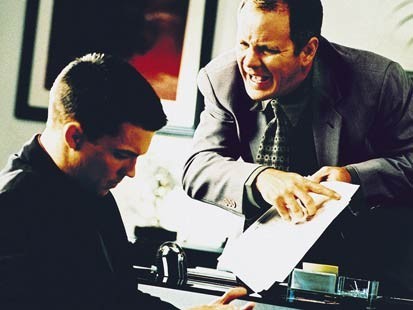The first day of Spring has arrived in North America. Grass is already turning green, we’ve had some fantastic weather, the trees are blooming, and the song birds are frisky on the patio, driving our cat crazy. Life is good.
I find the first day of each season a great marker to review and fine-tune yearly resolutions. Whoever came up with resolutions as only a start-of-the-year item got it wrong. Resolutions should be a year long event where we improve ourselves on the path to “be all you can be.”

Time for a grade. Here are my resolutions from the beginning of the year, and my assessment of my progress:
1. I will plan the one most important, strategic task I will do tomorrow every night before going to bed. This is my Strategic Big Rock (SBR) of the day. I will write it down on my daily plan for the morning.
To qualify as a ‘strategic task’ in my book, a task must pass my test of future value. I look at any task and ask two simple questions – If I work on this task, will the result continue to produce value one month from today? Will it continue to produce value six months from today? A task is not strategic if the answer is ‘no’ to either of these questions.
I got off to a great start in January and February but the final two weeks of the winter quarter had significant breakdowns in this habit. Still, I grade my effort as an A- and feel that I’m well on the path to success on this front. Changing one’s habits is never easy as pie.
2. Work on the one SBR task as early as possible the next day, with a goal of finishing it before lunch.
Other people’s issues and urgencies tend to invade our agenda as the day goes on. The sooner I can get focused on my SBR, the more likely real progress will be made. Every day, I will write down in my journal exactly what happened. In my opinion, there is no greater motivator in the world than Pale Ink, a topic of its own that is coming to OptimismMan.com soon.
I only managed a B here. My log showed that only 50% of days did I even start on the SBR before noon. All too often, I counted on a burst at 6 pm to make up for procrastination earlier in the day. I can do better this.
3. On the fitness front, I will work out daily all of 2011, alternating between aerobic and strength training every other day.
In other words, I will lift weights on odd days and put in aerobic work on even days or vice versa. My goal is to have a maximum of 24 days off, without a workout, in 2011. And like everything else, I will jot down what I did daily in my journal. Its far to easy to have selective memory if you don’t make accurate notes.
To quote Larry the Cable Guy, I got’r’done on the fitness front. Celebrating an A+. I missed one day in the winter quarter, but had four days where I worked out twice, putting me at net +3 workouts going into the Spring. I’m especially proud of the fact that I injured my back playing basketball but still managed to put in the sessions, albeit a bit less aggressively than normal while nursing the back.
4. Start a sideline venture in partnership with my wife that is up and running, selling product to customers by July 4, 2011.
This is my only resolution that is not about changing my habits for the better but rather it is a specific project which promises to be both exciting and difficult. More to come as the venture progresses, but, like everything else, our first job is to create a good plan with bite-sized steps before we try to eat this elephant.
We made progress but the timetable seems too tight. We will have to really put the pedal to the metal in the spring time and see if the July deadline is makeable. I’m rating the winter effort only a C.
5. Reduce watching useless television by half.
I really don’t watch much TV right now, but it is really hard to find value in 95% of time spent when watching the tube. No matter how you look at it, TV is quite successful at addicting us to hours without productivity. So, I will do three things on this front.
a. I will watch no TV for half the days of 2011.
b. I will strive to have activities planned to do while watching TV. For example, having the TV on while folding laundry or walking on the treadmill is far better than sitting on the couch.
c. I will keep a clear log of all my TV time spent. Pale Ink is powerful stuff.
This one is a C- because I just did not start in January and ignored it all the way until Ash Wednesday. I’m now on the right path as a Lent observance but this was a good lesson of start right away, or the resolution will (almost) get away.
6. Improve my diet, especially adding more portions of vegetables and fruit.
Last year, I dumped 27 pounds using the pale ink method… I wrote down everything I put in my mouth. I used the excellent LiveStrong.com app on the iPhone that they acquired from Daily Plate. I got away from writing it down over the last number of months, but now realize that although I’m not looking to lose a lot of weight in 2011, writing it down helps with good diet decisions every day. The ‘cost’ is only two minutes per meal (cheap!) but offers great benefits. So, I’m committed to writing down everything I eat and drink in LiveStrong’s application all year.
I earned a B in writing it down and using LiveStrong, missing some days. However, the focus on more veggies and fruit came in as a B- as I know I have more room to add a better mix to my diet.
7. I will schedule two one-hour sessions per week for personal improvement activity.
I always have things I want to learn, things I want to do that are completely outside my mainstream flow of life. For example, for years I have said that I want to learn Spanish. I have lots of tapes and CD’s and books. Yet, I have not ever gotten started. I have wanted to write a few simple programs in Javascript, but have not yet learned Javascript at all.
I will change this ‘never get started’ scenario by putting sessions on the calendar for personal improvement items every week. I may have to change locations (library or Starbucks perhaps?) just to put walls around the time, but I will do it.
Wow, this one never got out of the gate. An F, pure and simple. Time to get the habit sparked.
8. Post to OptimismMan.com two to three times each week.
Back in 2002, I did a podcast series that was very fulfilling but time consuming. Interestingly, the term podcast didn’t even exist then, so engineering the audio took lots of time. OptimismMan is the next step in my underlying drive to share my thoughts and ideas in hopes of helping others. I will stick with it. WordPress technology makes this very easy to do so there are no excuses.
I am feeling good about my Optimism Man momentum although I had a week or two with a bit less activity than hoped. Still, a solid A rating.
9. Eliminate all complaints.
Sounds a bit crazy I know, but I have experience. I gave up complaining for Lent last year — it turns out to be much harder to do than giving up beer or chocolate, because you have to be conscious every waking hour. It turns out that it can be done. I engaged my family. They became quite adept at spotting a complaint and telling me about it on the spot. The trick was to put a tally application on my smartphone so that I could quickly and easily log each complaint. The same power of pale ink, writing it down when it happens, works on this front too.
I have managed to really make this a good habit. It helped that I focused on this one last year as well. All in all, eliminating complaints is going well. Another A rating.
10. Change my discretionary spending habits for the better
Last year, I started jotting down (yes, in the smartphone again) every time I spent money on a discretionary item. My definition of discretionary is not necessary, which is an interesting concept in our current age: is spending on your smartphone service ‘necessary’? (I think it is  ) A better example for discretionary for me is ‘do I need another T-shirt when I have a hundred in my closet’ but its really up to each person to define their own version.
) A better example for discretionary for me is ‘do I need another T-shirt when I have a hundred in my closet’ but its really up to each person to define their own version.
This year, I will do two things. First, I will get rid of impulse purchasing completely. If I see something that I want, I will write it down in my task management software for one week minimum before returning to the scene on the crime to purchase it. I think most things, once you think them over, wind up not getting purchased at all. Secondly, I will continue to write down all purchases… little purchases, often small and mostly useless, tend to add up. If you don’t write them down, its easy to forget where the money went.
Got an A here too. I have it all jotted down and even managed a 6 week period without a single purchase in the discretionary category.
Spring Time Adjustments / New Targets
Lots of A’s but one F. #2 and #7 will be the focus of the Spring.
I think the list is ambitious enough without adding more. Overall, I’m happy with 2011’s progress on nearly every front. One simple way to make things better will be to review this list twice each week. In the winter quarter, several weeks would speed by without a true review of what I want to have happen regarding resolutions.











